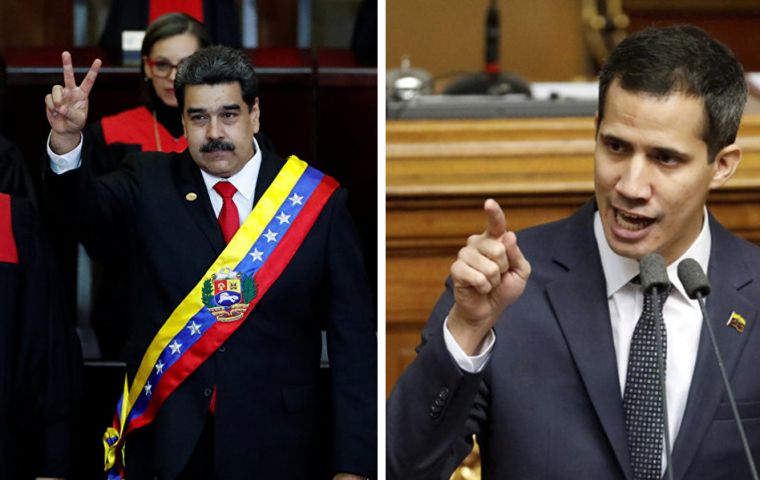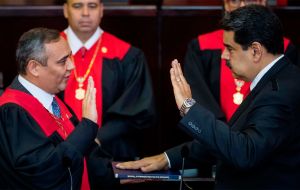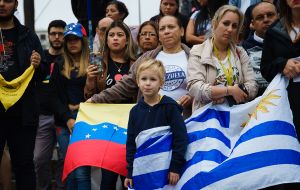MercoPress. South Atlantic News Agency
Venezuela in conflict of powers: Maduro took office, but Guaidó shows as president while Venezuelans protest
 Juan Guaidó will use the Constitution to assume as Venezuelan president after declaring Nicolás Maduro's usurpation of the charge
Juan Guaidó will use the Constitution to assume as Venezuelan president after declaring Nicolás Maduro's usurpation of the charge  Nicolás Maduro swore in the presidency for the 2019-2015 government period in front of the Supreme Court of Justice (TSJ), when the constitution of that country dictates that it is before Parliament t
Nicolás Maduro swore in the presidency for the 2019-2015 government period in front of the Supreme Court of Justice (TSJ), when the constitution of that country dictates that it is before Parliament t  Through platforms for Venezuelan immigrants, residents in Uruguay from that country met in Montevideo on Thursday expressing rejection of the takeover of Maduro. Photo: Sebastián Astorga
Through platforms for Venezuelan immigrants, residents in Uruguay from that country met in Montevideo on Thursday expressing rejection of the takeover of Maduro. Photo: Sebastián Astorga It seemed sure that, starting January 10, Venezuela would experience high uncertainty. Nicolás Maduro swore in the presidency for the 2019-2015 government period in front of the Supreme Court of Justice (TSJ), when the constitution of that country dictates that it is before Parliament that the president must present the inauguration. Both the international community and the National Assembly (AN), declared in contempt by the Supreme Court, mark Maduro as an usurper. The illegitimacy of the president is discussed globally and Juan Guaidó is recognized as interim president of the Republic.
The articles 333, 350 and 233 of the Venezuelan Constitution are in which the president of the National Assembly, Juan Guaidó, will use to assume as Venezuelan president after declaring Nicolás Maduro's usurpation of the charge.
“It must be the people of Venezuela, the Armed Forces, the international community that leads us to clearly assume the mandate that we are not going to wipe out, that we are going to exercise,” Guaidó said Friday from the offices of the United Nations (UN). in Caracas during an open Parliament hall called after the taking of Maduro.
Luis Almagro, the Secretary General of the Organization of American States (OAS) expressed through his Twitter account his support for Guaidó as president of Venezuela after he announced that he adheres to Article 233 of the Constitution. This position of repudiation of Maduro as president has been supported by the member countries of the European Union, the United States, the Lima Group, among other powers worldwide.
“We welcome the assumption of Juan Guaidó as Acting President of Venezuela in accordance with Article 233 of the Political Constitution. You have our support, that of the international community and the people of Venezuela”, tweeted Almagro.
However, the parliamentarian opposition argues that the support of the Armed Forces is crucial, starting from the thesis that the chain of command, in which the president of the Republic is the constitutional commander-in-chief of the Military, has been broken.
Political analyst Diego Cabrita argues that there is a “conflict of powers” in the Latin American nation. The double constitutional reading, from which there is a duplicate of each state power - a National Constituent Assembly (ANC), without opposition representation, against the AN; a Supreme Court Supreme Court with magistrates in exile appointed by the AN and now a double executive power deepens the atmosphere of political and economic uncertainty in a country where inflation estimated for 2019 reaches 10,000,000%, according to the Fund International Monetary Fund (IMF).
17 countries sent delegates of second level and only five presidents attended the ceremony in which Maduro took the disputed presidency, describing the ceremony as an act of peace, ensuring that it complied with the Constitution to “democratically take the reins of the country towards a higher destiny ”
For a president who based the rhetoric of his speeches solely on the figure of the late former president Hugo Chávez, without achievements, without projects and without his own political future, he devoted himself to repeating pitiful messages and assured that “Venezuela is the center of a World War.”
During a conference offered this Friday at the Foreign Ministry, Maduro said about OAS declarations in which Guaidó is recognized as interim president that ”it seems that a group of boys have taken control of the opposition and now want to play the destabilization, is the same group that led the guarimbas (street protests), every day they are going to get a new show and they meet at night to plan what the show will be the next day “.
Rejection of Venezuelans inside and outside the country
Through platforms for Venezuelan immigrants, residents in Uruguay from that country met in Montevideo on Thursday expressing rejection of the takeover of Maduro. Ángel Arellano, coordinator of the NGO Manos Veneguayas, predicts that an agenda of mobilizations will be created inside and outside the country in response to the conflict of powers that takes place in Venezuela.
”There is no agreement with any party within any country,” says Arellano regarding the support received by Uruguayan opposition politicians (right-wing). However, “it would be stingy and ungrateful not to mention that the National Party, the Colorado Party, the Independent Party or the People's Party have been extremely cooperative with the Venezuelan opposition cause in the sense of extending its claim to a political level,” Arellano declared during the concentration in Montevideo before the Executive, who did not adhere to the position of repudiation of the Venezuelan “illegitimate” President.
By Sebastián Astorga - Montevideo




Top Comments
Disclaimer & comment rules-

-

-

Read all commentsStrange. They recognised Castro as leader of Cuba, did they not? They recognise blatant dictators who don't even bother with elections, so why are they treating Venezuela differently?
Jan 12th, 2019 - 11:54 am 0DemonTree Because country's Constitution. Cuban regime stands over rules that validates them as a soberan dictatorship, while in Venezuela there is a Democratic base written by Chavez himself in 1999's constituent reform.
Jan 12th, 2019 - 02:01 pm 0Come now, Kamerad/Komrade Rique, come now, denounce your own support for Dictatorship and murder.... oh, that's right you're a murderer on the lam...
Jan 13th, 2019 - 03:03 am 0Commenting for this story is now closed.
If you have a Facebook account, become a fan and comment on our Facebook Page!